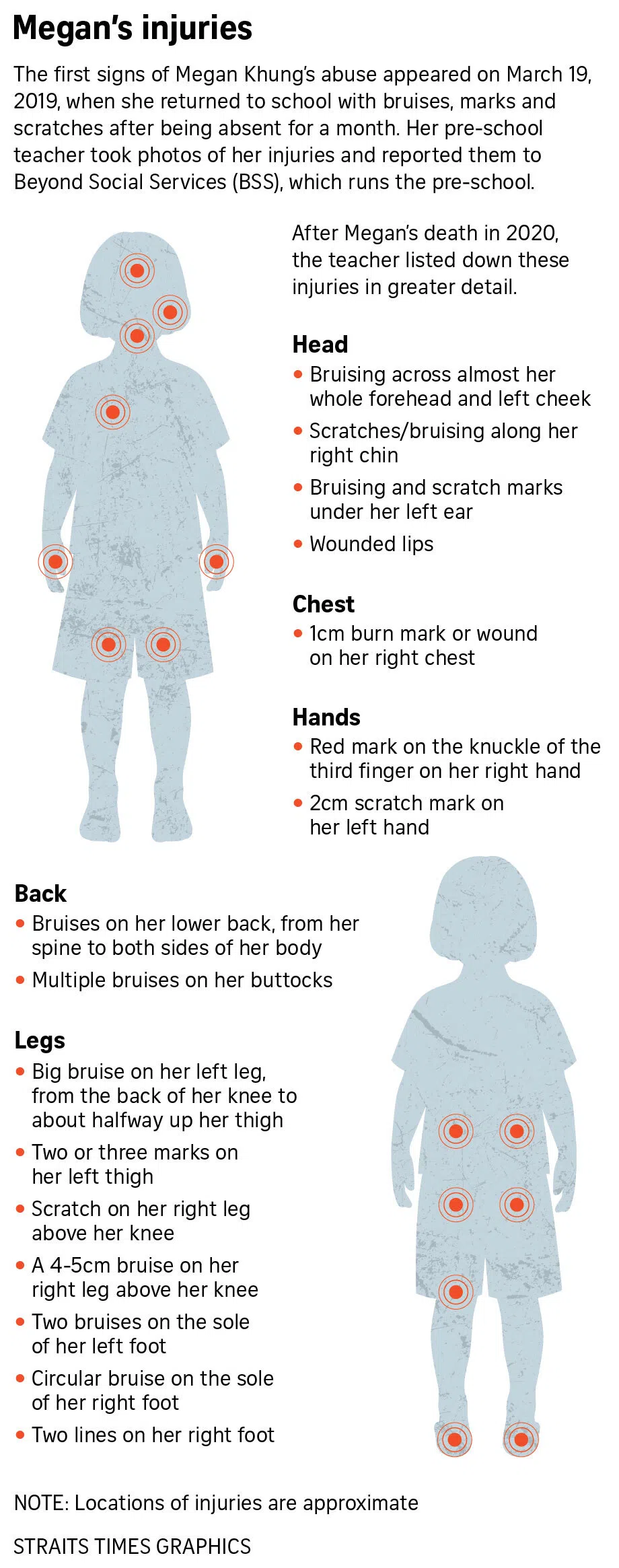Child protection agencies should handle all cases of child abuse: Panel reviewing Megan Khung case
Sign up now: Get ST's newsletters delivered to your inbox

Professor Kenneth Poon (second from left), chairman of the panel reviewing the Megan Khung case, speaking at a press conference on the panel's report. With him are panel members (from left) Zuraidah Abdullah, Corinne Ghoh and Vincent Ng.
ST PHOTO: ARIFFIN JAMAR
- The review recommends that child protection case management agencies handle all child abuse cases, requiring adequate resourcing from the MSF.
- An appeals mechanism should be established for differing agency views on risk levels to improve triaging consistency.
- The review acknowledged that protocols and processes in the child protection ecosystem have seen improvements since 2020.
AI generated
SINGAPORE - Agencies handling child protection should manage all cases of child abuse and be given adequate resourcing, said a panel reviewing the case of four-year-old Megan Khung, who was abused to death.
Such agencies refer to the Ministry of Social and Family Development’s (MSF) Child Protective Service, child protection specialist centres, protection specialist centres and family service centres.
This means that all other parties, like social service agencies, should focus on detecting and reporting possible child abuse in a timely manner, the panel said in its report released on Oct 23
Noting that this change may lead to an increase in the number of cases surfaced to child protection case management agencies, the panel recommended that MSF ensures the agencies are adequately resourced to carry out their roles.
The recommendation was one of seven that the panel made to improve Singapore’s child protection system, after its review of how agencies had handled Megan’s case. The young girl was physically and emotionally abused
In a statement on Oct 23, MSF said it accepts the recommendations and will study how to implement them, after consultation with parties in the sector. Further details will be given later, it added.
“We are sorry for the outcome. We acknowledge that more should have been done when we handled the case. We will learn from this incident,” said the ministry.
The panel also proposed setting up an appeals mechanism to address differing views on risk levels and how to manage cases.
While it would be impossible to eradicate variations in assessment due to human judgment, the panel said the consistency of triaging cases can be improved. Triaging in this context refers to the process of assessing inquiries to determine the urgency and appropriate response to protect a child.
The triaging agency must assess information “with a critical eye”, applying professional judgment to be alert to the possibility that the way facts are presented may affect how a case is assessed, said the panel.
Decisions should be recorded, reviewed and audited to ensure consistency, and feedback from agencies should be gathered. When agencies differ on whether a case requires referral or escalation, there should be a way to resolve such differences.
Minister-in-charge of Social Services Integration Desmond Lee said in a Facebook post on Oct 23 that MSF will study how to implement the recommendations quickly, which includes strengthening internal systems and communications.
Child protection work is challenging because it is preventive in nature, he said, and harm often occurs behind closed doors by family members. This means social workers and front-line officers must coordinate closely and exercise judgment in their work.
“We appreciate them for carrying this heavy responsibility. As we reflect on this incident and resolve to do better, let us continue to support them,” he said.
The panel said Megan’s case underscored the complexity of child abuse cases and the dynamic situation faced by agencies handling such cases. This requires professionals with the right competencies and experience, who are within agencies that are equipped with the right processes, to manage such cases, it said.
Child protection case management agencies also have certain powers, like requiring parents to let the agencies see the child physically. These agencies also have the data systems to better assess and manage cases.
It may be challenging for community agencies that work with children, but do not have official case management responsibilities, to adequately manage cases with child protection concerns, the panel said.
MSF said in response to queries that the average caseload for child protection officers has dipped from 40 cases per officer between 2018 and 2022, to around 35 in 2025, as part of improved workload management.
Among the panel’s other recommendations was for MSF to review the Early Childhood Development Agency’s (ECDA) role in reporting suspected or actual child abuse, including incidents that happen outside pre-schools.
The panel felt that ECDA licensing officers are not trained child protection specialists, and may not have the expertise to guide pre-schools on how to manage cases in the interim.
It also said MSF should work with the Singapore Police Force to correct the misconception that only family members can make a police report about a missing child.
Social service professionals should be clear of their duty to report suspected cases of abuse or missing children to the authorities, it added.
Another recommendation is to promote collective learning in the sector through reviewing and identifying improvements when a child known to social services dies.
Typically, in such cases, any findings are not shared with the wider sector. Going forward, MSF said it intends to share the findings and lessons learnt from critical incidents to help build a stronger and more resilient child protection system.
The panel also called for a stronger culture of support for those involved in child protection work, with employers providing structured support for staff handling emotionally demanding cases, as well as ensuring that all professionals working with children are sensitised to child safety issues.
In its statement, MSF said the child protection ecosystem and its processes have been strengthened over the years, drawing on lessons from past cases like Megan’s.

Megan Khung was physically and emotionally abused for more than a year by her mother, Foo Li Ping, and her mother’s boyfriend, Wong Shi Xiang (both above).
PHOTOS: CCXXCXCX/INSTAGRAM, INSTAGRAM
The review panel listed 12 improvements made by various agencies since 2020, including the setting up of the National Anti-Violence and Sexual Harassment Helpline (NAVH) in 2021 to provide a 24/7 hotline for the reporting of domestic violence, including child abuse.
All NAVH calls are automatically recorded and logged as a case record in the call management system.
ECDA also updated its Early Childhood Development Centres Code of Practice in 2021 to include clear guidelines and workflows for the reporting of suspected abuse in pre-schools. Since 2021, suspected cases of child abuse must be reported to ECDA within 24 hours, or within two hours if it is perceived to be serious.
In 2021, MSF and ECDA also established new protocols for pre-schools to follow up when a child with protection concerns is absent from school without a valid reason, or if the child is withdrawn from school.




